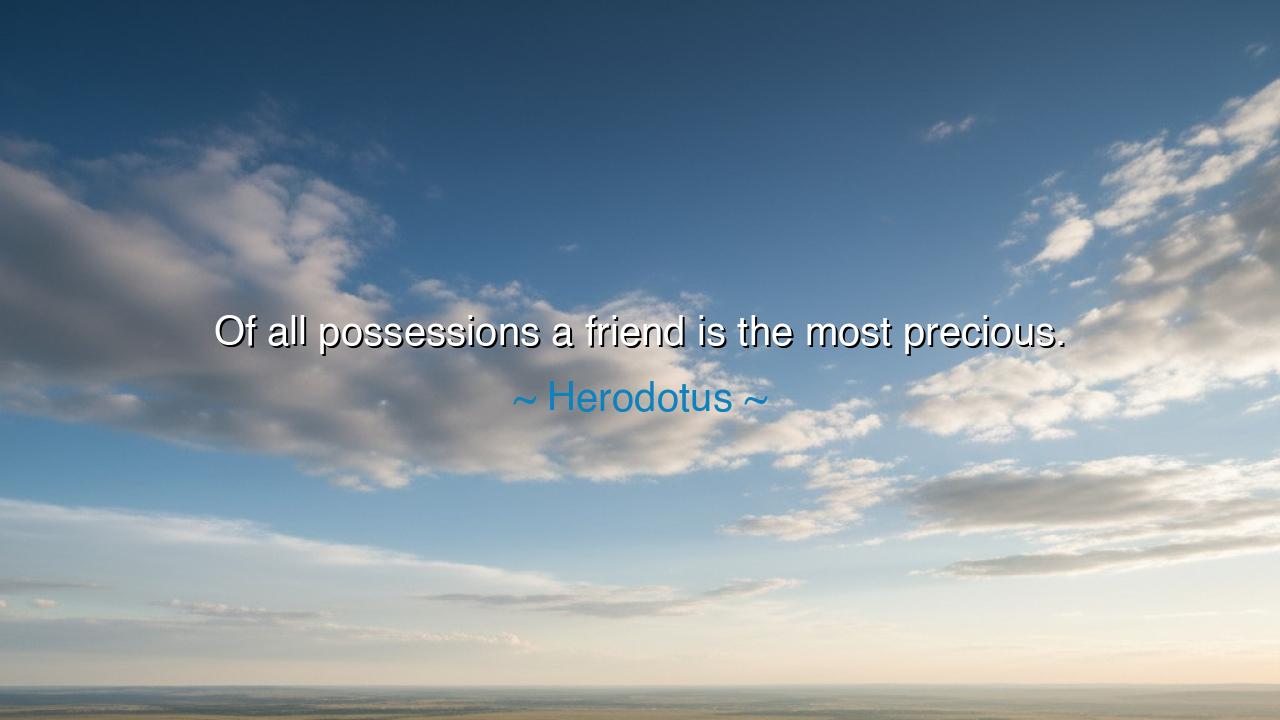
Of all possessions a friend is the most precious.






Herodotus, the Father of History, once spoke with timeless clarity: “Of all possessions a friend is the most precious.” These few words, simple as a drop of water and deep as the sea, carry within them the distilled wisdom of ages. For Herodotus, who chronicled the rise and fall of kings, the march of empires, and the triumphs and tragedies of men, saw one truth shining above all others — that friendship endures when gold crumbles, kingdoms fade, and glory turns to dust. In a world of fleeting treasures, the friend remains steadfast, unbought by riches, unbroken by time.
The origin of this truth lies in the ancient Greek understanding of life as a balance between fortune and virtue. Herodotus, who wandered across lands and studied the destinies of nations, saw that power and wealth brought not peace but peril. The mighty Croesus, richest of kings, learned that his gold could not save him when the wheel of fate turned. Yet even the humblest man, blessed with a loyal companion, possessed a wealth that could not be measured — the wealth of the heart. Thus, Herodotus declared that among all things one might own, a friend is the truest possession, for he is not held by chains but by love; not acquired by trade, but by trust.
To call friendship a possession may sound strange to modern ears, but in Herodotus’s time, the word carried a sacred meaning. It was not about ownership, but belonging — the bond between souls who share life’s burdens and joys as one. A friend, he implies, is not a mere ornament of life, but its foundation. Wealth may ease hunger and build shelter, but it cannot comfort the heart in sorrow. Power may win followers, but it cannot buy loyalty that endures through defeat. Only a friend — true and tested — can stand beside us in the storm and say, “I will not leave.” And such a treasure, Herodotus knew, was rarer than any jewel mined from the earth.
Consider the ancient tale of Damon and Pythias, told and retold throughout history. When Pythias was condemned to death, he begged leave to settle his affairs, promising to return. His friend Damon offered himself as hostage, to die if Pythias did not come back. The tyrant Dionysius laughed, thinking no man so foolish. Yet when the appointed day arrived, Pythias returned — weary, broken, yet true to his word. Moved by their loyalty, the tyrant set them both free, saying he had seen a virtue greater than power itself. This is what Herodotus meant: that of all possessions, none is so precious as the friend whose faith endures even when life itself is at stake.
Herodotus’s wisdom is not only for kings and philosophers, but for all who walk the path of life. We live in a world that prizes things that rust — gold, fame, comfort — and neglects the one treasure that never fades. A true friend is not counted in coin but in constancy; not in words spoken, but in deeds shared. When fortune smiles, he rejoices without envy; when it frowns, he remains without fear. Such friendship is not bought; it is cultivated, like a sacred fire that must be tended through care, honesty, and sacrifice. For only when we give freely of ourselves can we possess something — or someone — truly.
And so, my children of wisdom, learn this: seek not wealth, but worthy friends. Gold can be stolen, houses can burn, empires can crumble, but the heart that beats beside yours in loyalty can never be lost. Choose companions not for their usefulness, but for their goodness. Speak truth, forgive freely, give without keeping count. In doing so, you will draw to yourself souls of similar light, for as iron sharpens iron, so a friend strengthens a friend. Remember that friendship, like any precious thing, must be guarded — not by walls, but by sincerity and love.
To live without friendship is to live without warmth; to live with it is to dwell among stars. Herodotus, who saw empires rise and fall, knew that human connection is the only treasure that outlasts time. So when you measure your life, do not count your possessions by what fills your hands, but by who fills your heart. For at the end of all journeys, when the body grows weary and the glories of the world fade to silence, it is the friend — faithful, steadfast, and true — who remains beside you. And then you will understand the wisdom of the ancients: that indeed, of all possessions, a friend is the most precious.






AAdministratorAdministrator
Welcome, honored guests. Please leave a comment, we will respond soon